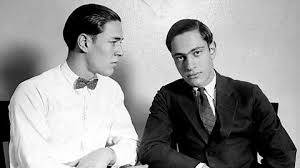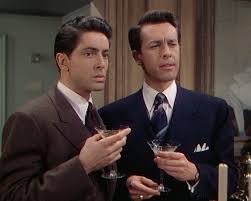A century ago today, a couple of rich numbskulls with the erroneous idea that they were somehow superior to the other members of the human race brutally killed a 14 year old boy just to prove to themselves that they could. They claimed to have been inspired by Nietzsche, but instead demonstrated the greater wisdom of Dostoevsky, whose Crime and Punishment spells out the truth about murder: even among those who can work up the courage to commit it, few can withstand the nerve-wracking aftermath.
The malefactors were a pair of students from the University of Chicago, Nathan Leopold (1904-1971) and Richard Loeb (1905-1936). The pairing of the names Leopold and Loeb always sounds to me like a vaudeville team, or tin pan alley songwriters, or perhaps a law firm. Sounds like, oh, Lerner and Loewe, or Bausch and Lomb, or something. Anyway, I’ve always considered it regrettable that these immature and cruel young men were both gay and Jewish, thus reinforcing unfortunate prejudices against both groups. As it happens, these self-proclaimed genius perpetrators of the “perfect crime” made several downright stupid mistakes, and were soon apprehended. The public wanted their heads, but attorney Clarence Darrow managed to get them life sentences. Loeb was murdered in jail. Leopold served over thirty years before being paroled.
The cold-blooded nature of the crime and the arrogance of those who committed it have fascinated writers ever since, and it’s surely one of the True Crime Ur-tales. There have been many stage plays and novels inspired by the case, many of them fictionalized, but three films in particular stand out as worth taking note of.
Rope
Patrick Hamilton, author too of Gaslight and Hangover Square, authored this 1929 play, which is strictly about the aftermath of the crime. It has much in common with The Tell-Tale Heart and Crime and Punishment, for it is about the inability of a malefactor to brazen out the lies that must be told to cover up wrong-doing. The original play was set in London, and took place entirely in an upscale flat, at a dinner party where the main characters have dispatched an old school-friend, and placed him in a trunk. The rope they strangled him with is in full view of the guests, as a kind of taunt. Though the setting and victim are different, the motivations and personalities of the main characters are plainly modeled on Leopold and Loeb, a fact that would have been obvious to folks in 1929, just five years after the crime.
In 1948, Alfred Hitchcock made the famous movie adaptation, transplanting the location to New York, with Farley Granger and John Dall as the young men, and Jimmy Stewart (miscast, I’ve always thought) as the provocative professor who unthinkingly planted the bad idea in their heads. The film is mostly famous today for echoing the precedent Hitchcock had set in Lifeboat, by restricting the location to a single claustrophobic space, amplifying the effect by staging the events in real time, shot entirely in a handful of long takes.
Compulsion
I feel like Hitchcock hangs over this version too, if only in that “one word Freudian melodrama title” trope we associate with him, a la Spellbound, Notorious, Suspicion, Vertigo, Pyscho, and Frenzy. (Roman Polanski mimicked this too in Repulsion and Frantic). This one is much more closely based on the real events, with name changes being the most major alteration. Chicago journalist Meyer Levin wrote the original 1956 book, which as a non-fiction novel may be considered a template for Truman Capote’s In Cold Blood. And if you think about it, what is the latter book but a variation of the Leopold and Loeb story? Different characters, different motivations, different types of victims. But a similar indifference to human life, and bungling of execution, and Capote seems to superimpose a relationship on Dick and Perry that feels intimate, reminiscent of the romantic one between Leopold and Loeb. Anyway, Repulsion was made into a 1959 film starring Dean Stockwell and Bradford Dillman, although what everyone always remembers is the big courtroom scene with Orson Welles as the Darrow-like lawyer making his impassioned case against the death penalty. The timing of the film was surely tied to the release of Leopold from prison the previous year.
Swoon
This 1992 movie marked the feature film directing debut of AIDS activist Tom Kalin and is now considered a landmark of Queer Cinema, for it is the first film to be explicit about the nature of the sexual relationship between Leopold and Loeb. It is also the first telling of the story not to change the names. It’s a thought-provoking, not to say confusing, movie. You might think a Queer film-maker would choose more sympathetic protagonists for a gay-themed film than Leopold and Loeb. He clearly wants to say something about stigmatization of homosexuality. And it’s true that the public often becomes about as savage as any murderer in response to such crimes, which often comes with a side order of prejudice against whatever group the accused malefactor “represents”.
But it’s a little tricky to tease that out from the obvious culpability of these two characters, and I’m not quite sure this film accomplishes that. The fact that Loeb was murdered while in the keeping of the state is indeed an outrage, as far as I’m concerned. Under our system, every citizen (no matter how provenly loathsome) is supposed to have the same rights. If your sentence is “life in prison” and not “death by execution”, then that is what you get. The negligence that results in the murder of a prisoner is frankly a crime of the same magnitude as the one Loeb committed. It is the exact same crime. It doesn’t matter that most of us revile somebody who could do what Loeb did. The law exists for a reason. No one, including employees of the state, can just unilaterally do murder, or allow it to happen, otherwise we revert to the jungle. Of course, most of us would lean a little harder on the more obvious point, that college students can’t just go around murdering teenage boys, but you also must admit that that point really is, or ought to be, self-evident.
Anyway, all this makes me nostalgic for the time when issues like this used to be what we argued about, as opposed to whether democracy ought to exist any more, or whether the American President ought to be all-powerful like a king and can commit any crimes that he wants, which is where we happen to be at the moment, although millions of people don’t seem to know it or acknowledge it. We are literally less than six months away from potentially naming a leader who has announced his attention to become a “dictator” who will visit “retribution” on his “enemies”, while eliminating all procedural checks on how he goes about that, up to and including murdering them.
Sorry, it’s time to stop swallowing soma. I’m going to be leaning into this whenever I can over the next few months. This blog is about the only tool I have to do so. Am I implying that Donald Trump is as bad as Leopold and Loeb? No. I’m SAYING it.





You must be logged in to post a comment.